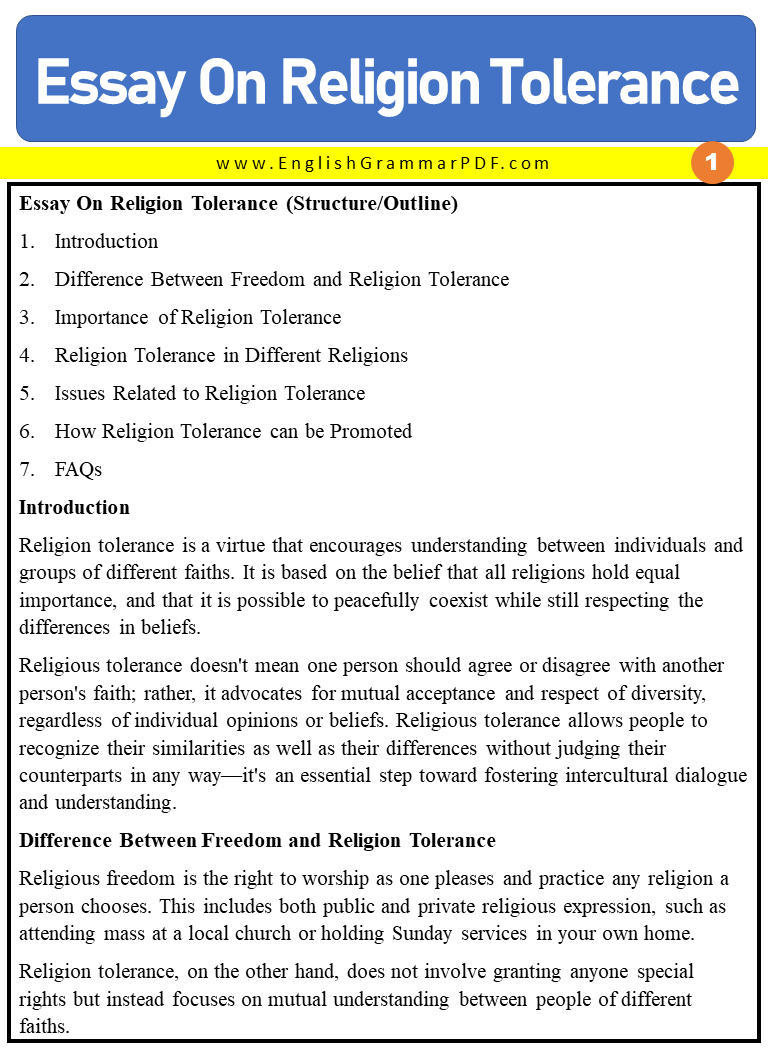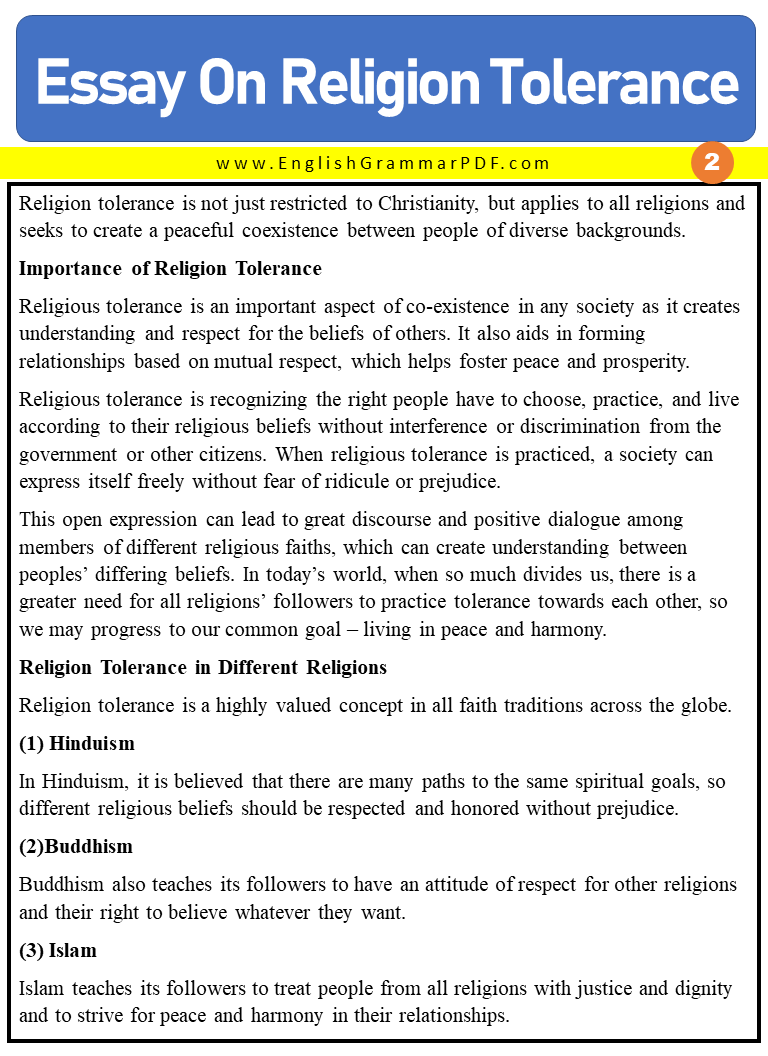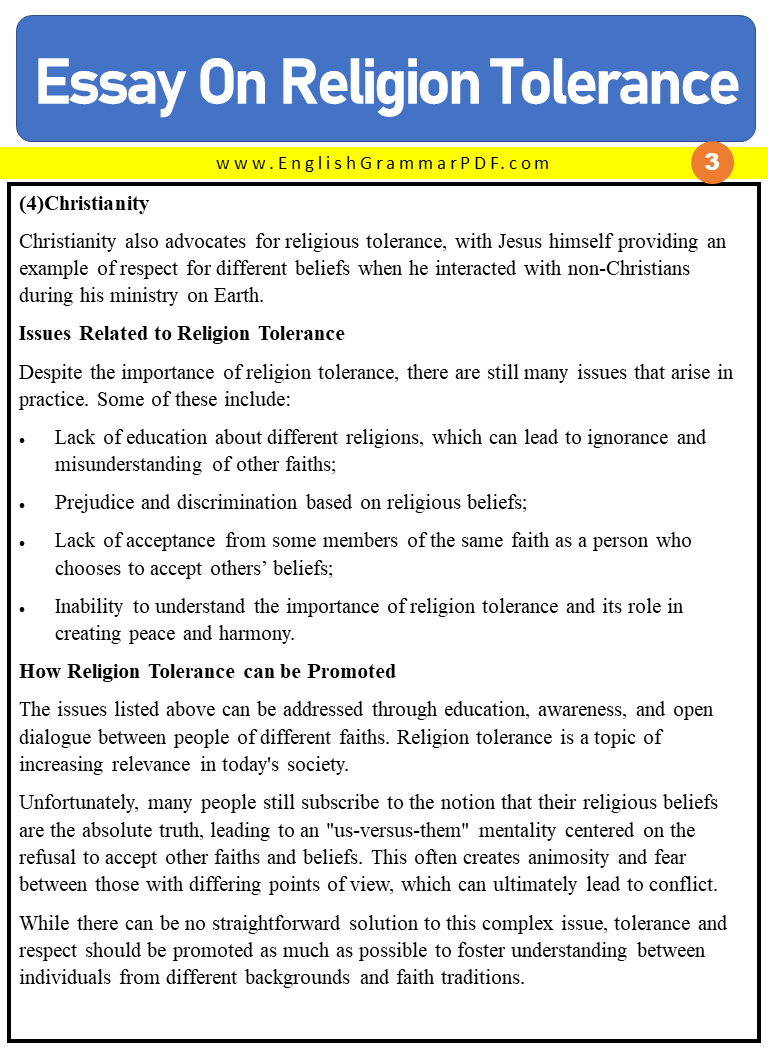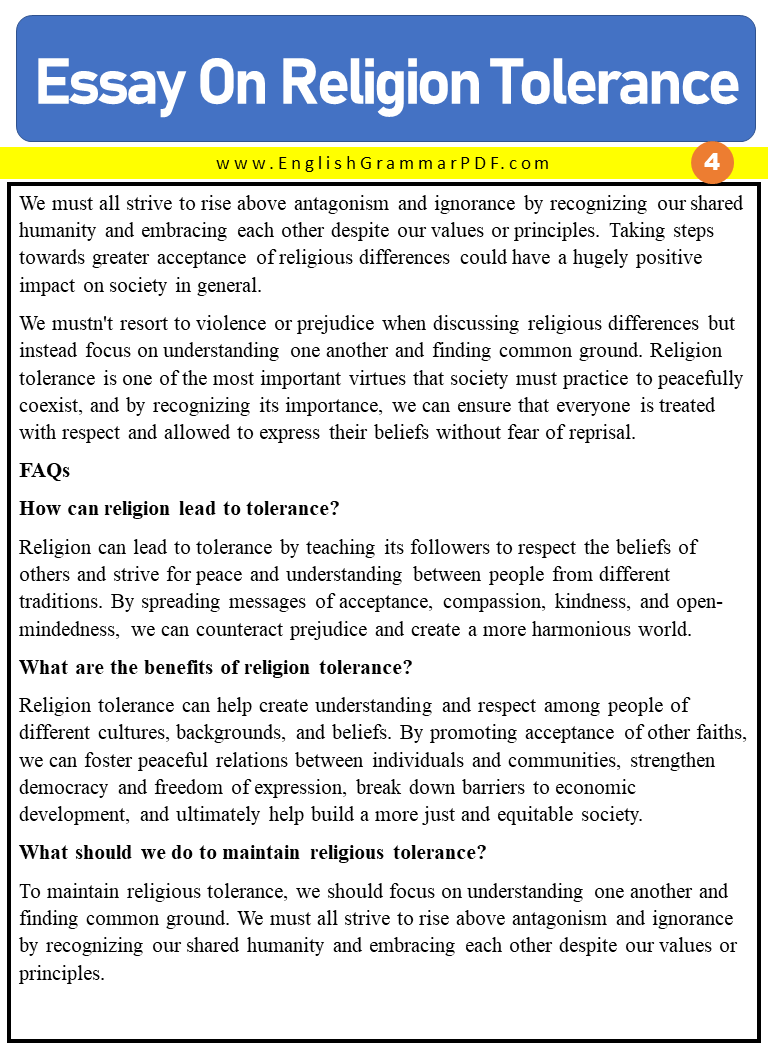Essay On Religion Tolerance (Structure/Outline)
- Introduction
- Difference Between Freedom and Religion Tolerance
- Importance of Religion Tolerance
- Religion Tolerance in Different Religions
- Issues Related to Religion Tolerance
- How Religion Tolerance can be Promoted
- FAQs

Introduction
Religion tolerance is a virtue that encourages understanding between individuals and groups of different faiths. It is based on the belief that all religions hold equal importance, and that it is possible to peacefully coexist while still respecting the differences in beliefs.
Religious tolerance doesn’t mean one person should agree or disagree with another person’s faith; rather, it advocates for mutual acceptance and respect of diversity, regardless of individual opinions or beliefs. Religious tolerance allows people to recognize their similarities as well as their differences without judging their counterparts in any way—it’s an essential step toward fostering intercultural dialogue and understanding.
Difference Between Freedom and Religion Tolerance
Religious freedom is the right to worship as one pleases and practice any religion a person chooses. This includes both public and private religious expression, such as attending mass at a local church or holding Sunday services in your own home.
Religion tolerance, on the other hand, does not involve granting anyone special rights but instead focuses on mutual understanding between people of different faiths. Religion tolerance is not just restricted to Christianity, but applies to all religions and seeks to create a peaceful coexistence between people of diverse backgrounds.
Importance of Religion Tolerance
Religious tolerance is an important aspect of co-existence in any society as it creates understanding and respect for the beliefs of others. It also aids in forming relationships based on mutual respect, which helps foster peace and prosperity.
Religious tolerance is recognizing the right people have to choose, practice, and live according to their religious beliefs without interference or discrimination from the government or other citizens. When religious tolerance is practiced, a society can express itself freely without fear of ridicule or prejudice.
This open expression can lead to great discourse and positive dialogue among members of different religious faiths, which can create understanding between peoples’ differing beliefs. In today’s world, when so much divides us, there is a greater need for all religions’ followers to practice tolerance towards each other, so we may progress to our common goal – living in peace and harmony.
Religion Tolerance in Different Religions
Religion tolerance is a highly valued concept in all faith traditions across the globe.
(1) Hinduism
In Hinduism, it is believed that there are many paths to the same spiritual goals, so different religious beliefs should be respected and honored without prejudice.
(2)Buddhism
Buddhism also teaches its followers to have an attitude of respect for other religions and their right to believe whatever they want.
(3) Islam
Islam teaches its followers to treat people from all religions with justice and dignity and to strive for peace and harmony in their relationships.
(4)Christianity
Christianity also advocates for religious tolerance, with Jesus himself providing an example of respect for different beliefs when he interacted with non-Christians during his ministry on Earth.
Issues Related to Religion Tolerance
Despite the importance of religion tolerance, there are still many issues that arise in practice. Some of these include:
- Lack of education about different religions, which can lead to ignorance and misunderstanding of other faiths;
- Prejudice and discrimination based on religious beliefs;
- Lack of acceptance from some members of the same faith as a person who chooses to accept others’ beliefs;
- Inability to understand the importance of religion tolerance and its role in creating peace and harmony.
How Religion Tolerance can be Promoted!
The issues listed above can be addressed through education, awareness, and open dialogue between people of different faiths. Religion tolerance is a topic of increasing relevance in today’s society.
Unfortunately, many people still subscribe to the notion that their religious beliefs are the absolute truth, leading to an “us-versus-them” mentality centered on the refusal to accept other faiths and beliefs. This often creates animosity and fear between those with differing points of view, which can ultimately lead to conflict.
While there can be no straightforward solution to this complex issue, tolerance and respect should be promoted as much as possible to foster understanding between individuals from different backgrounds and faith traditions.
We must all strive to rise above antagonism and ignorance by recognizing our shared humanity and embracing each other despite our values or principles. Taking steps towards greater acceptance of religious differences could have a hugely positive impact on society in general.
We mustn’t resort to violence or prejudice when discussing religious differences but instead focus on understanding one another and finding common ground. Religion tolerance is one of the most important virtues that society must practice to peacefully coexist, and by recognizing its importance, we can ensure that everyone is treated with respect and allowed to express their beliefs without fear of reprisal.
FAQs
How can religion lead to tolerance?
Religion can lead to tolerance by teaching its followers to respect the beliefs of others and strive for peace and understanding between people from different traditions. By spreading messages of acceptance, compassion, kindness, and open-mindedness, we can counteract prejudice and create a more harmonious world.
What are the benefits of religion tolerance?
Religion tolerance can help create understanding and respect among people of different cultures, backgrounds, and beliefs. By promoting acceptance of other faiths, we can foster peaceful relations between individuals and communities, strengthen democracy and freedom of expression, break down barriers to economic development, and ultimately help build a more just and equitable society.
What should we do to maintain religious tolerance?
To maintain religious tolerance, we should focus on understanding one another and finding common ground. We must all strive to rise above antagonism and ignorance by recognizing our shared humanity and embracing each other despite our values or principles.
What does it mean to promote religious tolerance?
Promoting religious tolerance means recognizing the importance of respecting and accepting people from different faiths. It involves acknowledging that each religion has its own beliefs, traditions, and practices and working to create an environment where everyone is free to express their faith without fear or persecution.
What are the disadvantages of religion tolerance?
The disadvantages of religion tolerance can include:
Ignorance and misunderstanding about different religions.
Unwillingness to engage in respectful conversations with people who have different religious beliefs.
Exclusion of certain groups based on their religious beliefs; Potential for conflict between groups of people who have different religious views.
Essay On Religion Tolerance (Pictures & PDF)





Related: Essay On Religion In Schools
Below is the PDF of this Essay.
Download PDF BOOK


